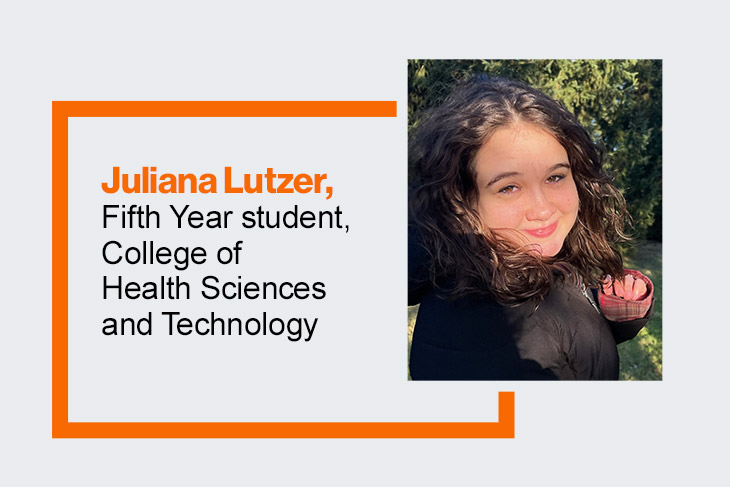Clinical experience gives RIT physician assistant student a new perspective
RIT student Juliana Lutzer leans toward trauma care
Juliana Lutzer is an RIT physician assistant student. She is also a personal trainer and plays violin in the Red Brick String Quartet.
Ever since since elementary school, Juliana Lutzer knew she wanted to work in medicine.
Lutzer chose a career as a physician assistant for the high level of patient interaction, variety, and flexibility. She likes knowing that she can practice medicine in different specialty areas throughout her career.
Now, as a fifth-year student in RIT’s physician assistant BS/MS program, Lutzer is gaining clinical experience at healthcare sites in the region under the guidance of supervising physicians, or preceptors.
Since last May, Lutzer, who is from Fairport, N.Y., has worked as a student physician assistant in a pediatrics office in Wolcott, N.Y., internal medicine at Unity Hospital, trauma at Strong Memorial Hospital, and plastic surgery at Unity Hospital. Now, she is working in the emergency room at the Clifton Springs Hospital.
To graduate and sit for the national licensing board, Lutzer and her cohort must complete 10 different clinical rotations—including two electives. Students spend four and half weeks at each clinical site and return to RIT for two days of end-of-rotation exams, lectures, and quizzes.
Here, Lutzer shares what it’s like to step from the classroom into the real world of healthcare and to work with patients.
How has RIT prepared you for your clinical rotations?
I think that they give us a very good grounding in the clinical information about diseases, processes, treatments, pathophysiology, all the basics we need to be successful. I have been able to answer preceptors’ questions, and I've been able to come up with good plans for my patients. There is a lot that I still have to learn, but I have a good foundation.
What was your first day like?
I started in a pediatric office. I had shadowed my preceptor for the first few cases, and she asked me what I thought about it. Then she said, ‘You go see this patient and come back and tell me what you think, then I'll go see them.’ By the end of the day, I was seeing patients by myself, and it was scary, but I was ready for it.
My first patient was a newborn visit. I got to see the baby and her parents multiple times while I was there, and it's just really amazing to be able to make connections with patients, even as a student.
I have come across those people who say, ‘What are you, 12?’ And you know they don't have confidence in you, but that's OK. I understand where they're coming from, but for the most part, people understand that I'm a student and I'm learning and that they're still going to get the same level of care. I'm being overseen and my preceptor is still talking with them.
Did you have any experience with the RIT & Rochester Regional Health Alliance before you started clinical rotations?
As fourth year students, they let us dip our toe in a little bit, and once every two weeks they would take us to Rochester General Hospital to see patients who were willing to let us practice doing what we call H&P, which is a history and physical diagnosis.
The patients were understanding and the healthcare workers on the floor were supportive. They would give us a thumbs up as we were walking by. Obviously, we were terrified at seeing patients for the first time, but they made it a good experience.
What have you enjoyed?
The people. The preceptors I've had are very willing to teach, willing to engage me in patient care. They're definitely very focused and they think that it's very important to help students make it to that next step, that next level. By week four, I finally feel that I'm fitting in. I can do things on my own, and the preceptors are a huge part of getting me there.
In terms of content, I think that I’m definitely more surgically inclined. I love working with my hands and doing sutures. Even pre- and post-op care I find interesting. Seeing which patients got cleared for surgery, which people didn’t, and how we can optimize them.
Personally, I love the urgency of everything, especially in trauma, and that's why I'm really excited to be doing my emergency rotation because you get the very acute cases.
What have you learned about the field?
I have learned a lot about the day-to-day in the medical field and how a hospital functions as a system.
What have you learned about yourself?
I think that every PA student feels overwhelmed. I am really surprised with how well I've been able to handle it. I am developing a thick skin and resilience, and the ability to be told I'm wrong and learn from it. I think that that's a very important skill to develop, and I say skill because nobody likes being told they're wrong.
What would you recommend to younger students who are coming up in the program?
I would recommend that they definitely take those didactic years, the third and fourth years of the program, seriously. Sometimes you need to miss social events to study for your test the next day, but it's worth it once you are in rotations and you realize that you know the material. It's also really important not to go the opposite direction and miss everything social. It's about finding that good balance.











